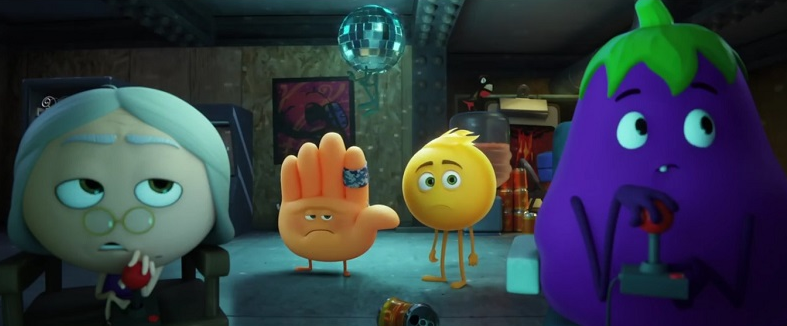By Sean Donovan

The internet has spent the past few days savagely ripping apart The Emoji Movie, the animated film about sentient emojis and the adventures they have within your smartphone. This is a film made specifically for children of the internet, who might gaze upon this Sony vertical integration monstrosity of app references and infomercials for about a minute before heading back to their own smartphones. It’s tough to review The Emoji Movie, because it’s tough to take its lack of creativity and basic construction seriously when such cynicism and apathy burns off the screen. It singes your eyebrows. No one cared about making this movie; I can’t imagine anyone coming up with a criticism the filmmakers would even protest. The Emoji Movie is the unadulterated heart of capitalism pumping out disinterested beats, an infomercial for WeChat here, a paid ad for CandyCrush there, Sony everywhere you look...
At a brisk 86 minutes no one would ever accuse The Emoji Movie of feeling long; when the film was done I barely felt like I had sat through anything. It’s an experience akin to walking past a wall of advertisements.
Cynicism and apathy are the key words for The Emoji Movie, yet someone whom I would never call cynical nor apathetic, Mike White, is credited as one of the film’s writers. I love Mike White, and it stings that such a visionary, who also wrote one of the year’s best films thus far, Beatriz at Dinner, has this embarrassment stuck to his resumé. Much like how Alexander Payne has that credit for I Now Pronounce You Chuck and Larry. White has tackled new media before, in his masterwork the HBO series Enlightened. In the episode “Follow Me,” our central character, over-enthusiastic wannabe activist Amy Jellicoe (Laura Dern) discovers the online activism of social media, and after quickly following PETA, Amnesty International, and Mia Farrow on twitter, finds herself swept up in a world where it finally feels like people are doing things, where the external stimulation of new media can change the world for the better. Mike White is moved by the investment and emotion people poor into their feelings of online connectivity. Amy whispers in breathy melancholic voiceover
I have joined the new world. I learn its language. Clicking and flashing and pinging. I read its signs, electric, invisible. In this world the meek like me will finally rise.”

I’m not sure what’s changed from “Follow Me”’s airdate in 2013 until now, but the hope, if even foolish hope, invested in new media then has dried up entirely. The Emoji Movie also uses breathy voiceover, this time not the voice of eternal goddess Laura Dern but instead the rough voice of T.J. Miller, an actor who seems to be hellbent on a mission to alienate everyone in Hollywood. Miller starts the film, narrating as his character, the misfit under-performing “meh’ emoji Gene, prophecizing that attention spans are getting lower every day, and soon all language will narrow to emoji speak. A friend of Alex’s, the human pre-teen who owns the smartphone where all the plot activity takes place, at one point screams “WORDS AREN’T COOL!” Is this a dystopian drama made by tech-fearing curmudgeons? If the outermost level of The Emoji Movie is empty-headed adventure spectacle and Sony advertising, its surprising core is a kernel of hate for those damn kids that can’t get off their phones!
The Emoji Movie has a plot, allegedly, but I’m paying it about as much respect as the filmmakers do. Unable to perfect the “meh” face of apathy in a world where all emojis are called on to maintain complete emotional discipline, Gene is targeted for deletion by emoji overlord Smiler (Maya Rudolph, straining to keep the energy up). On the run from Smiler’s goons, Gene and his friend Hi-5 (James Corden) seek a notorious hacker, Jailbreak (Anna Faris) who may have the power to re-program Gene into the emoji he always wanted to be. This, of course, doesn’t come to pass, as everyone learns a lesson about individuality and affirming emotional diversity. The emojis’ world of Textopolis admirably has a standard of gender-neutral restrooms, although Gene and Hi-5 are both shocked to discover Jailbreak is a girl, bizarrely establishing hacking as a “man’s job” which is a context this film didn’t need. There are the requisite celebrity cameos, some that make sense (Patrick Stewart as the poop emoji, his inherent vocal dignity contrasting with his fecal appearance) and some that are just plain odd. Sean Hayes as the devil emoji? Celebrity chef Rachel Ray as the concept of spam email?
 But I would be remiss not to expand on the character of the film that affected me most profoundly, which is James Corden’s Hi-5. Hi-5 is the comic relief of the film, in that most scenes pass with Gene and Jailbreak reciting all the expository lines and Hi-5 getting a punny joke or two in. He is a large hand, the size of every other anthropomorphic emoji with the same legs and feet, only with eyes and a mouth in the center of his palm. Hi-5’s four fingers almost act as his hair, occasionally blowing behind him, sometimes resting curved towards the front of him. His thumb frequently acts as a hand, such as when he stuffs food into his palm-mouth in several chilling scenes, sometimes his hair-fingers helping to force food in. Watching Hi-5 eat I felt viscerally unhappy, I’m sure only a fraction of the unhappiness James Corden must have felt supplying all these lines for a jokey hand, whose emotions and motives are unexplained for the entirety of the film.
But I would be remiss not to expand on the character of the film that affected me most profoundly, which is James Corden’s Hi-5. Hi-5 is the comic relief of the film, in that most scenes pass with Gene and Jailbreak reciting all the expository lines and Hi-5 getting a punny joke or two in. He is a large hand, the size of every other anthropomorphic emoji with the same legs and feet, only with eyes and a mouth in the center of his palm. Hi-5’s four fingers almost act as his hair, occasionally blowing behind him, sometimes resting curved towards the front of him. His thumb frequently acts as a hand, such as when he stuffs food into his palm-mouth in several chilling scenes, sometimes his hair-fingers helping to force food in. Watching Hi-5 eat I felt viscerally unhappy, I’m sure only a fraction of the unhappiness James Corden must have felt supplying all these lines for a jokey hand, whose emotions and motives are unexplained for the entirety of the film.
In a particularly despondent moment, while Hi-5 waits for his friends to rescue him atop a pile of techno-waste in the smartphone’s trash can, he sings in a mock blues style “Nobody knows the touch screens I’ve seen….Nobody knows my screen shots.” The sheer laziness and lack of energy in the pun work is both maddening and utterly exhausting. But it’s an apt picture of the film overall: waiting in a garbage can, half-heartedly searching for puns when you know the effort doesn’t matter anyway.
At least it’s short.
Grade: D
Reviews of other eligible Animated Oscar Contenders this year:
In this Corner of the World (Japan) reviewed by Tim Brayton
The Big Bad Fox (France) reviewed by Tim Brayton
Coco (US) reviewed by Jorge Molina
The Girl Without Hands (France) reviewed by Tim Brayton
The Breadwinner (Ireland/Canada/Luxembourg) reviewed by Nathaniel
The Boss Baby (US) reviewed by Nathaniel R
Loving Vincent (UK/Poland) reviewed by Tim Brayton
Smurfs: The Lost Village (US) reviewed by Tim Brayton
Birdboy: The Forgotten Children (US) reviewed by Tim Brayton